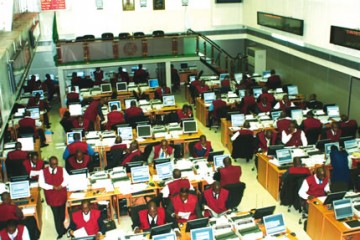Investors staked N99.34 billion on 12.29 billion shares, transacted in 104,578 deals at the Nigerian Stock Exchange last month, the News Agency of Nigeria reports.
Statistics released by the Exchange on Tuesday in Lagos, indicated that the performance was against a total of eight billion shares worth N85.84 billion achieved in 110,405 deals in January.
The data also showed that the turnover of shares traded inched by 53.63 per cent.
A breakdown of the statistics showed that the financial services sector emerged the most active, accounting for 10.64 billion shares, valued at N54.56 billion transacted in 59,030 deals.
The conglomerates sector came second on the month’s activity chart with an exchange of 559.69 million shares worth N3.13 billion traded in 6,223 deals.
NAN reports that market capitalisation during the period dropped by N298 billion to close at N12.707 trillion, against N13.005 trillion achieved in January.
Also, the NSE All-Share Index lost 1012.72 basis points or 2.29 per cent to close at 39,558.89 from 40,571.62 recorded in January, due to profit taking.
David Adonri, the Chief Executive Officer of Lambeth Trust and Securities Limited, said that the decline experienced in February was as a result of sales pressure mounted by foreign investors.
Adonri said that the situation in the international capital market made foreign investors to offload their holdings in the Nigerian equities market.
He also attributed the market depression to the tightened monetary policy and the suspension of Malam Sanusi Lamido Sanusi, the Central Bank of Nigeria Governor, by President Goodluck Jonathan.
Adonri said that the market would likely experience improved growth in March because it had fully reacted to the tight monetary policy and suspension of Sanusi.
“Being in the earnings season, future direction of the market will be determined by the impressive full year results of quoted companies,” Adonri said.
Sehinde Adenagbe, the Managing Director of Standard Union Securities Limited, attributed the downward trend to an increase in the Cash Reserve Requirement by the apex bank.
Adenagbe said that banks exited the market during the period, due to the CRR review.
He added that scarcity of funds in the economy contributed to the lull in the market during the period under review.
Previous ArticleNASS to lift embargo on electronic voting – Ekweremadu
Next Article Police arrest 13 cult members in Lagos


